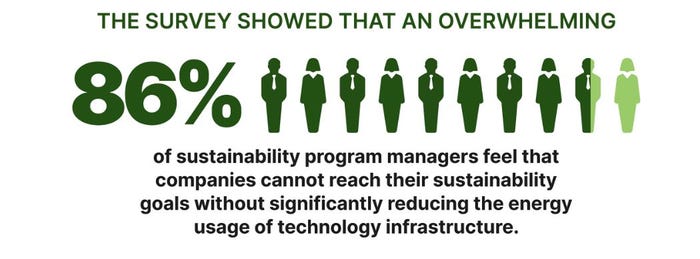Automation Helping Organizations with Sustainability EffortsAutomation Helping Organizations with Sustainability Efforts
Automation is playing a critical role in helping companies meet their sustainability goals, thanks to its ability to increase efficiency and speed to value.
March 8, 2023

Sustainability is, and will continue to be, a major strategic priority for businesses, and automation is expected to continue to play a major role in achieving sustainability efforts.
Automation has proved to help organizations overcome the cost and complexity challenges that come with managing sustainability efforts, helping to reduce the high volume of manual tasks organizations heavily rely on from their employees.
Automation allows companies to gather the data needed to glean insight into their progress in quick fashion and can also help identify and prioritize actions that organizations need to take to adjust and improve their approach to sustainability.
A survey of 800 global executives commissioned by UiPath and carried out by research firm IDC reveals the majority (54%) of organizations are already using enterprise automation technologies to help implement sustainability initiatives.
Driving these initiatives is not only a desire to boost operational efficiencies and cost savings (40%), but also to enhance brand value and trust (33%).
Nearly a quarter (24%) of respondents said they plan to deploy automation in the coming two years, as they look to surmount challenges — including information silos and lack of operational technology — hampering sustainability programs.
Fully a third of respondents also cited difficulty in identifying key performance indicators (KPIs) related to gauging sustainability efforts as a major stumbling block.
A December study by Pure Storage also shows sustainability teams and IT teams aren't working together, especially when purchasing IT equipment and infrastructure.
That survey also revealed that the vast majority of sustainability program directors say companies cannot reach sustainability goals without significantly reducing energy usage of technology infrastructure.

Pure-Storage
While many organizations report difficulty when it comes to implementing initiatives, the survey indicated automation has helped accelerate these processes, ultimately helping increase the value of their sustainability goals by taking away the chance for human error.
Benefits of Using Automation for Sustainability
Among the chief benefits of deploying automation to aid sustainability efforts were, according to the UiPath study, the ability to more easily source data (55%) and the ability to develop new value propositions, products, and services (53%).
A third of respondents listed the importance of IT efficiency as a top priority for sustainability programs, followed responsible sourcing (28%) and overall energy efficiency and employee well-being (27%).
Deployment of automation was also seen to enable easier understanding of operational performance and improvement areas (52%), while another top automation use case for sustainability was process improvement (45%).
With sustainability being a major strategic priority for organizations today, leaders are continuously looking for ways to speed up their efforts, and organizations that are advanced with intelligent automation are also the most advanced with sustainability initiatives.
This finding from the survey indicates that the bigger the push businesses make on automation, the more they can achieve with sustainability.
To create higher and longer-term value for stakeholders, organizations are leveraging automation technology to enhance operational agility, efficiency, and speed to value, which holds true for all sustainability initiatives and efforts, as well.
Why There's No 'One-Size-Fits-All' App for Sustainability
However, there is no "one-size-fits-all" application that will support a sustainability initiative because organizations have their own unique goals, priorities, and starting points.
While developing a sustainability strategy will include a wide range of stakeholders, including customers, suppliers, investors, government officials, employees, and individuals within the community, enterprise automation platforms can also help unlock potential and "fill the gaps" in making sustainability initiatives actionable.
The report also indicated that organizations are maturing their overall sustainability posture from a human resources perspective, with nearly seven in 10 (68%) of respondents revealing they have a board member specifically responsible for sustainability.
In addition to automation, one of the simplest ways to act on sustainability is also one of the most cost-effective: migrating the organization's applications to the cloud.
Growing regulation on greenhouse gas disclosure has also sparked demand for help from the tech industry, with tech giants including Salesforce and Microsoft joining at least a dozen startups providing products to help companies calculate their impact on the environment.
About the Author
You May Also Like








.jpg?width=700&auto=webp&quality=80&disable=upscale)
